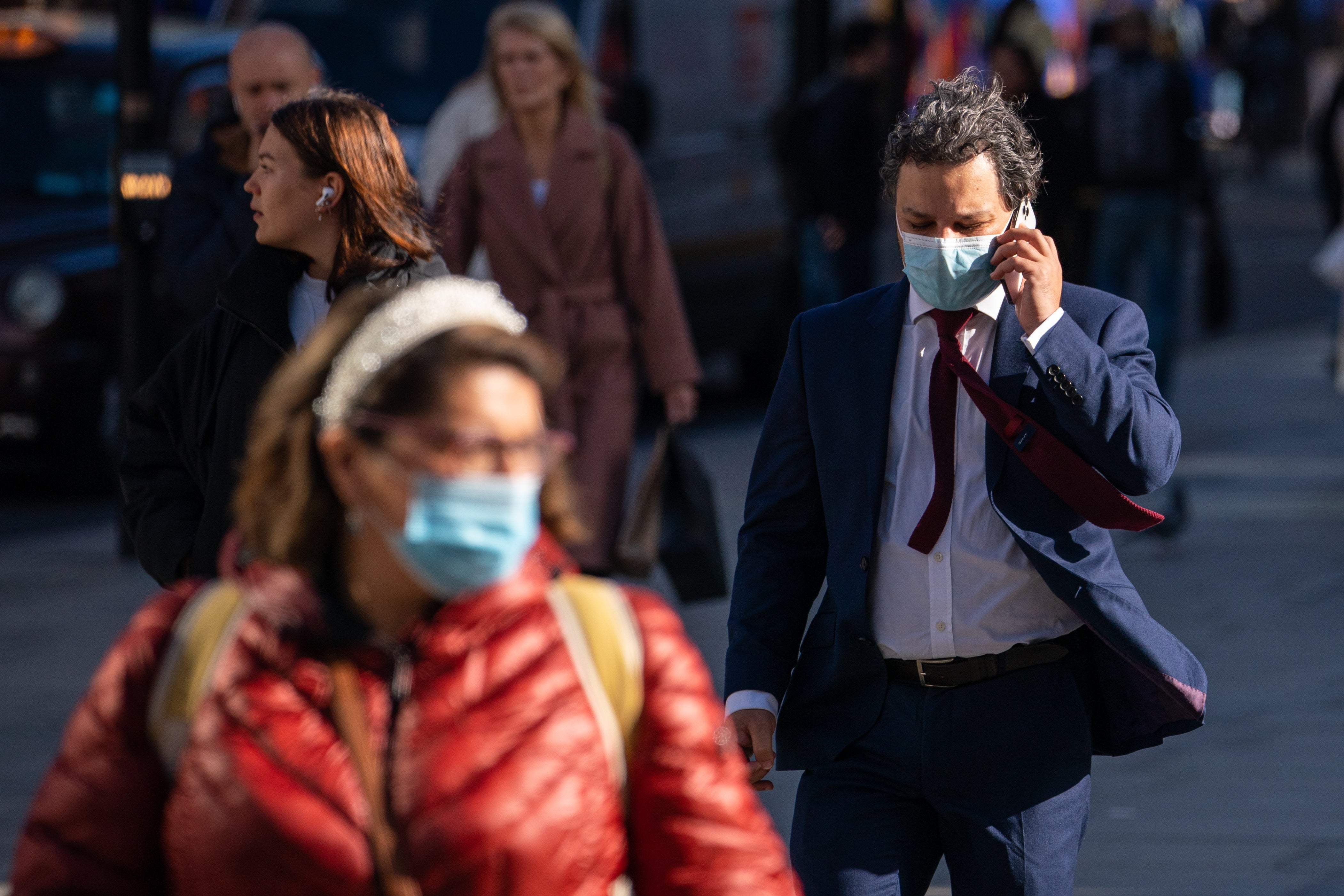Face masks return to England and UK arrivals to have PCR tests in new measures
Millions more people in the UK will become eligible for a Covid-19 booster vaccine as the world waits to find out more about the new variant.

Your support helps us to tell the story
From reproductive rights to climate change to Big Tech, The Independent is on the ground when the story is developing. Whether it's investigating the financials of Elon Musk's pro-Trump PAC or producing our latest documentary, 'The A Word', which shines a light on the American women fighting for reproductive rights, we know how important it is to parse out the facts from the messaging.
At such a critical moment in US history, we need reporters on the ground. Your donation allows us to keep sending journalists to speak to both sides of the story.
The Independent is trusted by Americans across the entire political spectrum. And unlike many other quality news outlets, we choose not to lock Americans out of our reporting and analysis with paywalls. We believe quality journalism should be available to everyone, paid for by those who can afford it.
Your support makes all the difference.Measures to combat the new Omicron variant of coronavirus come into force on Tuesday as the Prime Minister said Covid-19 vaccines and boosters remain the best line of defence.
Face coverings are again compulsory in England in shops and settings such as banks, post offices, hairdressers, and public transport, while all travellers returning to the UK must take a PCR test and self-isolate until they receive a negative result.
All contacts of suspected Omicron cases must self-isolate, regardless of their age or vaccination status.
The Joint Committee on Vaccination and Immunisation (JCVI) is now advising that all adults aged 18 to 39 should be offered a booster dose of the Covid-19 vaccine, in order of descending age groups, to increase their level of protection.
Those aged 40 and over are already eligible for a booster vaccine.
The JCVI said booster doses should be given no sooner than three months after people have had their second dose of an original vaccine – shaving three months off the current six-month wait.
In further advice, young people aged 12 to 15 should be offered a second dose of the Pfizer/BioNTech Covid-19 vaccine, no sooner than 12 weeks after their first dose.
The NHS said it will shortly set out how staff will expand the booster programme.
The measures taking effect today are proportionate and responsible, and will buy us time in the face of this new variant
A spokesman said this will include how booster jabs will be given in priority order so that the most vulnerable people are protected first, while also increasing capacity to vaccinate millions more people in a shorter space of time.
“The NHS will contact you when you are due to book in for your lifesaving booster vaccination, and when you get the call, it’s vital that people come forward as quickly as possible,” the spokesman said.
Prime Minister Boris Johnson said: “The measures taking effect today are proportionate and responsible, and will buy us time in the face of this new variant.
“Based on everything we know, our vaccines and boosters remain our best line of defence, so it is more important than ever that people come forward when eligible to get boosted.
“Not only will today’s steps help us slow down the variant’s spread, but they will help us protect each other and the gains we have all worked so hard for.”
The measures in place are described by Number 10 as “temporary and precautionary”, and will be reviewed in three weeks.
England’s deputy chief medical officer Professor Jonathan Van-Tam told a Downing Street briefing on Monday that the booster campaign has “never been more vital than at this point in time”.
Prof Van-Tam said scientists around the world agree that the Omicron variant is “of increased concern”.
He said there are still uncertainties about how transmissible the variant is and its impact on severity of disease.
He said the “number of mutations present, already on first principle, makes us worry about a possible effect on vaccine effectiveness”.
He made clear that there “are far more things we don’t know yet, than things we do know” about the variant, but that he expects more to become clear in three weeks.
MPs will debate and vote on new Covid restrictions in England, including face coverings in shops and public transport, on Tuesday.
A number of Tories are deeply unhappy at the prospect of a return of controls – but with Labour backing the measures there is little chance of a Government defeat.
Meanwhile, England is the only UK nation where working from home is not encouraged.
Scotland’s First Minister Nicola Sturgeon reminded people on Monday to “work from home if possible”.
The advice is the same in Northern Ireland, and working from home is encouraged under current guidance in Wales.
On Monday the Prime Minister’s spokesman said it was up to employers to decide on the “right balance” for them, when it came to whether staff worked from home or the office.
Jurisdiction over coronavirus restrictions is devolved, meaning Mr Johnson’s policies apply to England, and may differ from the rules elsewhere in the UK.
Mr Johnson is expected on Tuesday to visit a GP surgery where people are receiving booster jabs.